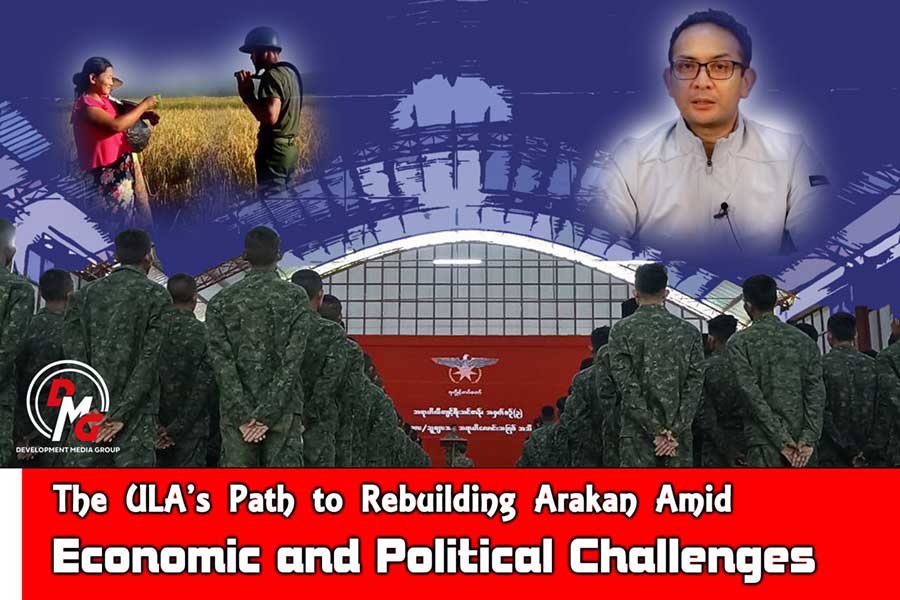- Hindus express hope for educational reform under AA administration
- Arakanese zat pwe performers struggle to survive as conflict halts traditional shows
- India-Arakan trade routes fully reopen after two-month closure
- When Prisoners Are Bombed, the War Has No Rules Left
- Two civilians killed, two injured in junta airstrike on Ramree village
The ULA's Path to Rebuilding Arakan Amid Economic and Political Challenges
Frankly, the promotion of democracy should not be a priority at this juncture. Instead, the focus must be on addressing the deep-rooted socioeconomic challenges that have plagued the people of Arakan for years under the oppressive control of both the military and the National League for Democracy (NLD) government.
For many in Arakan, the concept of democracy is tainted by the scars left by the NLD party, whose rule was marked by systemic repression of Arakanese people and political communities.
As such, rebuilding the state demands a more pragmatic approach, prioritising stability and development over democratic ideals.
22 Oct 2024

Written by Myo Nyein Naing (St. Olaf College)
In a recent dialogue with The Diplomat, Major-General Twan Mrat Naing, commander-in-chief of the Arakkha Army (AA), articulated that governance over Arakan would be structured under a Unitary State system. This framework will be overseen by the United League of Arakan (ULA), in close collaboration with its military wing, the AA, cementing a strategic alliance between political leadership and armed forces in the region.
In theory, the Unitary State system is inherently centralised, placing authority squarely under the control of a single governing entity - in this case, the United League of Arakan (ULA), as Major-General Twan Mrat Naing outlined in his interview. Under such a framework, opposition parties would hold no significant sway, consolidating power solely within the ULA. This centralised approach appears to be a strategically sound choice, especially in light of the current political climate in Arakan, for two compelling reasons.
- The need for quick and effective policy implementation is crucial while Arakan undergoes reconstruction.
Frankly, the promotion of democracy should not be a priority at this juncture. Instead, the focus must be on addressing the deep-rooted socioeconomic challenges that have plagued the people of Arakan for years under the oppressive control of both the military and the National League for Democracy (NLD) government. For many in Arakan, the concept of democracy is tainted by the scars left by the NLD party, whose rule was marked by systemic repression of Arakanese people and political communities. As such, rebuilding the state demands a more pragmatic approach, prioritising stability and development over democratic ideals.
- The ULA commands unparalleled support and trust among the people of Arakan, standing out as an institution unlike any other.
Founded and led by a new generation of young, educated leaders, the ULA's credibility and authority are unmatched in the region. No other organisation enjoys the same level of public confidence or influence. As the sole entity with supreme control over the state, the ULA is uniquely positioned to spearhead rapid and comprehensive reforms. Under its unitary leadership, it is anticipated that Arakan will experience a faster transformation than previously envisioned, driven by this deep-seated public support. The voices of the public should matter, though the time for full-fledged democratic rule may be deferred for some years.
Diplomatic and Foreign Policy
Despite the absence of a shared physical border, China plays a significant role in shaping the political and economic landscape of Arakan. China's substantial investments and mega-projects in the region give it considerable influence over Arakan's economy. For the ULA, maintaining a strong diplomatic relationship with China is essential.
Simultaneously, the ULA must navigate the delicate task of managing Rohingya issues in a manner that appeals to Western nations, whose support is pivotal for international legitimacy. However, fostering close ties with China could provoke criticism from Western democracies, given China's opposition to their political values and policies. As a regional hegemon, China wields more influence over Arakan than the United States or Russia, making its alliance both strategically indispensable and diplomatically complex for the ULA.
Limits of Reform
Corruption
Despite the overall strong governance of the ULA, instances of corruption have emerged among lower-level law enforcement in Arakan. To safeguard its credibility and maintain public trust, the ULA must address these issues decisively, ensuring transparent actions and public accountability. Clear penalties and firm decisions on corruption must be communicated openly to demonstrate the ULA's commitment to integrity.
Additionally, law enforcement officials require comprehensive training to break away from the entrenched system of bribery, known locally as "tea-pocket money," which has long been normalised by fear and tradition. By eradicating this culture of corruption, the ULA can further solidify its legitimacy and reinforce public confidence in its leadership.
Economic Constraints
Undeniably, Myanmar has been grappling with soaring inflation since the military coup, driven by battles, economic sanctions, and severe supply chain disruptions. As Major-General Twan Mrat Naing has affirmed, Arakan will remain part of the Union of Myanmar, meaning the kyat, Myanmar's national currency, must continue to circulate in Arakan.
This reality complicates the ULA's ability to address inflation effectively, as it cannot exercise independent monetary policies. Consequently, the ULA will be forced to rely on fiscal measures to combat inflation - a strategy that is both capital-intensive and time-consuming. The widespread destruction of infrastructure, including roads, bridges, and public buildings, further hampers the swift execution of these fiscal policies.
As a result, the public must exercise patience throughout this transformative period. While challenges persist, improvements in living standards and opportunities for a better future are on the horizon, though they will require time and sustained effort.
About the author: Myo Nyein Naing is a university student majoring in quantitative economics and political science at St. Olaf College in the United States.







.jpg)












